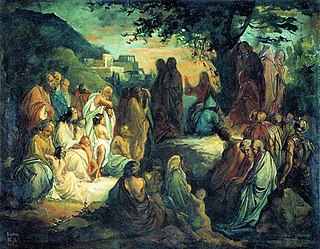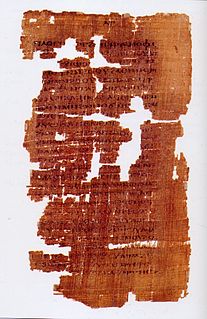Related Research Articles

Matthew 3:2 is the second verse of the third chapter of the Gospel of Matthew in the New Testament. John the Baptist has just been introduced and this verse describes the message that he is preaching. Through John's message, Matthew introduces the "Kingdom of Heaven".

Matthew 3:9 is the ninth verse of the third chapter of the Gospel of Matthew in the New Testament. The verse describes an incident where John the Baptist berates the Pharisees and Sadducees. He has previously called them a brood of vipers and warned them of the wrath to come and has urged them to repent. In this verse he warns that their links to Abraham will not save them.

Matthew 5:12 is the twelfth verse of the fifth chapter of the Gospel of Matthew in the New Testament. It is the tenth verse of the Sermon on the Mount. This verse is generally seen as part of an expansion of the eight Beatitude, others see it as the second half of the ninth Beatitude, a small group feel it is the tenth Beatitude and thus brings to a close a second Decalogue.

Matthew 7:12 is the twelfth verse of the seventh chapter of the Gospel of Matthew in the New Testament and is part of the Sermon on the Mount. This well known verse presents what has become known as the Golden Rule.
Matthew 11:11 is the eleventh verse in the eleventh chapter of the Gospel of Matthew in the New Testament.

Matthew 7:23 is the twenty-third verse of the seventh chapter of the Gospel of Matthew in the New Testament and is part of the Sermon on the Mount. This verse continues Jesus' warning against false prophets.
Matthew 11:29 is the 29th verse in the eleventh chapter of the Gospel of Matthew in the New Testament.
Matthew 9:17 is a verse in the ninth chapter of the Gospel of Matthew in the New Testament.
Matthew 11:16 is the sixteenth verse in the eleventh chapter of the Gospel of Matthew in the New Testament.

Matthew 10:15 is the fifteenth verse in the ninth chapter of the Gospel of Matthew in the New Testament.
Matthew 10:19 is a verse in the ninth chapter of the Gospel of Matthew in the New Testament.
Matthew 10:20 is a verse in the ninth chapter of the Gospel of Matthew in the New Testament.

Matthew 10:27 is the 27th verse in the ninth chapter of the Gospel of Matthew in the New Testament.

Matthew 10:26 is the 26th verse in the ninth chapter of the Gospel of Matthew in the New Testament.

The Second Epistle of Clement, often referred to as 2 Clement, is an early Christian writing. It is considered canon by the Coptic Orthodox Church.
John 1:21 is a verse in the first chapter of the Gospel of John in the New Testament.
Matthew 12:31-32 are two verses in the twelfth chapter of the Gospel of Matthew in the New Testament.
Matthew 12:36-37 are a set of verses in the twelfth chapter of the Gospel of Matthew in the New Testament.
Matthew 14:15-21 is a set of verses in the fourteenth chapter of the Gospel of Matthew in the New Testament.
Matthew 15:15-18 is a set of verses in the fifteenth chapter of the Gospel of Matthew in the New Testament.
References
- ↑ Robert Witham, Annotations on the New Testament of Jesus Christ. Dublin: 1730.
- 1 2 3 4 5 6 "Catena aurea: commentary on the four Gospels, collected out of the works of the Fathers: Volume 6, St. John. Oxford: Parker, 1874. Thomas Aquinas".
 This article incorporates text from this source, which is in the public domain.
This article incorporates text from this source, which is in the public domain.